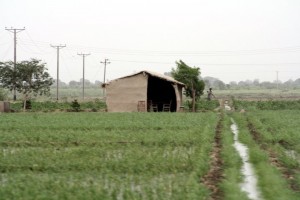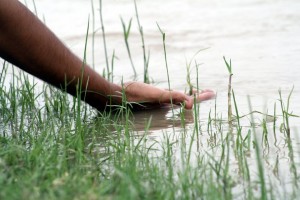
Photo Credit: StudioFarazBashir
April 17 is the International Day of Peasant Struggle, commemorating the massacre of 19 peasants struggling for land and justice in Brazil in 1996. Every year on that day actions take place around the world in defense of peasants and small-scale farmers struggling for their rights.
In recent years, we have suffered from the implementation of new policies and of a new development model based on land expansion and land expropriation, commonly known as land grabbing. Land grabbing is a global phenomenon led by local, national and transnational elites and investors, with the participation of governments and local authorities, in order to control the world’s most precious resources.
Land grabbing has resulted in the concentration of the ownership of land and natural resources in the hands of a variety of pressure-groups which include, large-scale investors, plantation owners, logging, hydro-power and mining companies, tourism and real estate developers, port and infrastructures authorities, and so forth. This has led to the eviction and displacement of the local populations – usually farmers, the violation of human rights and women rights, increased poverty, social fracture and environmental pollution. Land grabbing goes beyond traditional North-South imperialist structures: the involved transnational corporations for example, are based in the United States, Europe, Chile, Mexico, Brazil, Russia, India, Pakistan, China, South Africa, Thailand, Malaysia, Indonesia and South Korea, among others.
Land grabbing in relation to the corporate sector is a global phenomenon based on the corporate domination of agriculture through control over land, water, seeds and other resources. It is justified by many governments and policy think-tanks through claims that agri-business will modernize backward agricultural practices, and guarantee food security for all. However widespread those claims may be, they have been shown to be entirely false in the real world.
The fundamental thought behind corporate land grabbing prioritizes profit over people’s well-being. It will produce agro-fuels if this is more profitable than food production, and they export their food production if this is more lucrative than selling it at home, even if either action is against the interests of the local people and especially of the farmers. This is a reality that is to be seen all over the world.
In this race to profit, the corporate sector is increasing its control over food production systems, monopolizing resources, and dominating decision making processes. Business lobbies have strong political influence that often overrides democratic institutions; in addition, they act with the complicity of local and national elites (traders, politicians and community leaders) who fail to protect their own people from predation.
National Peasants Coalition of Pakistan (NPCP) or Pakistan Kisan Sangat (PKS) organized a seminar on April 17, 2012, at Hyderabad Press Club, to commemorate this day. On this occasion, NPCP/ PKS launched an OPEN LETTER to political parties and civil society in order to set the tune of the political agenda in favour of peasants struggle in Pakistan.
The role of corporate sector has become very critical in Pakistan agriculture scenario, with the Board of Investment (BOI) of the Government of Pakistan also offering a package of attractive incentives to investors who wish to initiate large-scale farming in Pakistan.
The main purpose of such corporate farming appears to be to grow food grains / crops and export to countries where food production is modest or absent, such as Middle East Gulf region. While this will apparently yield foreign exchange earnings, it is potentially also a dangerous trend, as it can have a direct impact on the future food security of our own people.
Further, the peasants and small farmers risk being the direct causalities of large-scale farming, as the large farmers will lease their lands to investors, who will replace peasants with modern machinery, and in this way the large landlords will get rid of peasants conveniently. In the face of corporate farming, small farmers will find farming business not viable against high-tech corporate sector and will be forced to sell their lands to them cheaply, to migrate to already heavily populated troubled urban towns.
Corporate farming can also pose a serious threat to the environment as deep-drilling will exploit fossil water and high concentrations of chemical-based pesticides and fertilizers will pollute agro-ecology and the food-chain.
On the International Day of Peasant Struggle, it is most appropriate that the concept of corporate farming is reviewed and reconsidered, and if it deemed necessary, then first all the stated concerns are addressed satisfactorily. Cooperative farming is an effective alternate to corporate farming, as in cooperative farming, the small farmers and peasants can work together.
Policy makers are well advised to give thorough and serious consideration to promoting cooperative farming in existing farm lands and planning for corporate farming in the vast lands still available that are not already under the plough. However even with this approach, it will first of all be necessary to first create sufficient new supplies of water to meet the substantial needs of corporate farming. Rainwater harvesting, saving water through stopping seepage in canals and other means can easily be adopted to create new water, for the increasing demand and for future needs.






